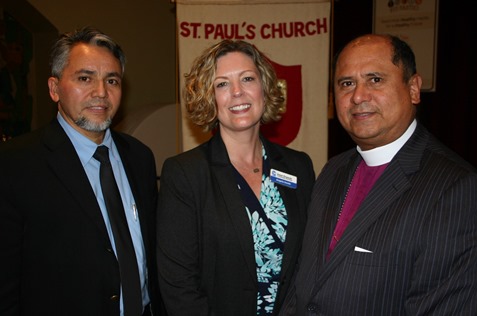by Murrel Bland
More than 400 children were killed in El Salvador during the first three months of 2016. That is one of the challenges that the Rt. Rev. David Alvarado faces in El Salvador.
Alvarado is the Episcopal bishop of the Diocese of Salvador. He spoke during the Labor Day weekend at St. Paul’s Episcopal Church, 1300 N. 18th St., Kansas City, Kan. He came here on behalf of the Episcopal Dignity and Justice program. This program works in cooperation with St. Francis Community Services with headquarters in Salina, Kan. St. Francis has a branch office in downtown Kansas City, Kan.
“We must work together to stop the violence,” Bishop Alvarado said.
Angela Smith, the director of mission engagement for St. Franics, said that matters like poverty, violence, immigration and human trafficking are shared issues that can be addressed more effectively if we work together.
El Salvador is a country in Central America of about 6.3 million persons in an area of about 8,100 square miles. Many of its residents suffer because of a lack of educational and employment opportunities—something that Bishop Alvarado said needs to be corrected.
Smith said the violence is a result of “death squads” and gang members who often target children, particularly boys.
Jose Lopez, a lawyer who works with Bishop Alvarado on behalf of human rights issues, said he commends Pope Francis for his calling these issues to the public. These issues in Central America are quite similar to those in other parts of the world, Lopez said.
Smith said that El Salvador suffers from a “sweat shop” economy that makes it very difficult for its residents to break out of a cycle of poverty.
Many children from El Salvador immigrate to Mexico and then to the United States. This is very dangerous—however, often not as dangerous as living in El Salvador. Some of these children end up in Kansas and are served by St. Francis.
Smith said she will be working with Bishop Alvarado and his staff when they sponsor a week-long reconciliation conference in El Salvador. A keynote speaker will be the Rev. Michael Lapsley of South Africa. Lapsley worked with the Rt. Rev. Desmond Tutu, a bishop of Johannesburg who won the Nobel Peace Prize for his opposition to apartheid. Bishop Tutu also developed a program of reconciliation that helped assure a fair and democratic society would prevail, as South Africa became an integrated country.
Murrel Bland is the former editor of The Wyandotte West and The Piper Press.

